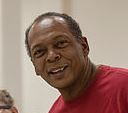Kansas Profile – Now That’s Rural: Richard Pitts, Living History
March 20, 2019
What if you could meet Harriet Tubman in person? What if you could see John Brown in the flesh? What if you could hear Frederick Douglass or Clarina Nichols first-hand? The closest this will happen without a time machine is to participate in a living history experience where these characters are depicted, live and in person. Such a living history experience is now being planned for rural Kansas.
 AT RIGHT: Richard Pitts | Download this photo.
AT RIGHT: Richard Pitts | Download this photo.
Richard Pitts is director of the Wonder Workshop, a children’s museum which carries out exhibits and programs to teach about the arts, sciences, and humanities. Richard is originally from New Jersey. He came to Manhattan, Kansas to study history at K-State. “I fell in love and it was the best thing that ever happened to me,” Richard said. He met and married Cindy and they stayed in Manhattan to raise their family.
In 1989, Richard began developing the concept of a children’s educational program in the arts, sciences and humanities. The concept was tested with displays and programs at the Manhattan Arts Center. Interest was evident so Wonder Workshop opened downtown in 1995. For a time, the program operated in a building owned by the school district.
In 2000, Wonder Workshop acquired land near Tuttle Creek Lake where nature-based programs and leadership camps are offered to groups and businesses. Opportunities include hiking, treehouses, ziplines, fossil-finding, science exploration, a climbing wall, and more.
“In 2013, we also acquired a house on 4th Street where we offer exhibits and programs,” Richard said. “Thanks to Bethel AME Church, it is rent-free for 20 years.” The house had fallen into major disrepair. “I could look up through the roof and see the sky,” Richard said. The house was refurbished with a grant from the Caroline Peine Foundation and became the primary location for Wonder Workshop.
Today, Wonder Workshop offers a variety of opportunities such as after-school programs for students from kindergarten to sixth grade, parents night out, discovery days when school is out of session, birthday parties, field trips, and much more in addition to the summer camps. “We operate with volunteers from the community and K-State,” Richard said.
“Our goal is to develop self-reliant children, families, and community members,” according to the website. “Our hands-on activities and exhibits instill a desire for lifelong learning, recognizing our cultural diversity, and fostering creative potential.”
Richard Pitts has always had a strong interest in African history, including the Underground Railroad through which men and women escaped from slavery prior to the Civil War. He started leading tours of historic free-state-related sites southeast of Manhattan. Those sites included the Underground Railroad route along the Kansas River Valley and the Beecher Bible and Rifle Church in the rural community of Wabaunsee with a township population of 456 people. Now, that’s rural.
Richard knew of locations in the eastern U.S. where living history presentations were staged using the Underground Railroad as a theme. He had the idea of implementing such a program in the Manhattan area.
In April and May 2019, Wonder Workshop is conducting the living history experience near Manhattan. Full disclosure: This event will be held on land my family owns south of town, which we volunteered for this purpose.
The program is called “Our Continuing Journey: From Bondage to Freedom.” From 4:00 to 6:30 p.m., participants will be placed in the role of slaves. They will experience an auction, an escape, and personal encounters with the costumed characters of Harriet Tubman, Frederick Douglass, John Brown, and Kansas abolitionist Clarina Nichols. This will be followed by a meal and time for discussion and reflection. The event ends at 7:30 p.m.
Advance registration is required. The event is targeted at adults and children, 10 years of age or older. For more information, go to www.wonderworkshop.org.
Harriet Tubman, John Brown, Clarina Nichols, Frederick Douglass. How interesting it would be to meet them first hand. We commend Richard Pitts and all those involved with Wonder Workshop for making a difference by providing growth opportunities for children, in addition to this special opportunity for people to join in this participatory theater experience. I hope it will help our understanding of these issues to come alive.
Audio and text files of Kansas Profiles are available at http://www.kansasprofile.com. For more information about the Huck Boyd Institute, interested persons can visit http://www.huckboydinstitute.org.
----------------
The mission of the Huck Boyd National Institute for Rural Development is to enhance rural development by helping rural people help themselves. The Kansas Profile radio series and columns are produced with assistance from the K-State Research and Extension Department of Communications News Media Services unit. A photo of Ron Wilson is available at http://www.ksre.ksu.edu/news/sty/RonWilson.htm.

